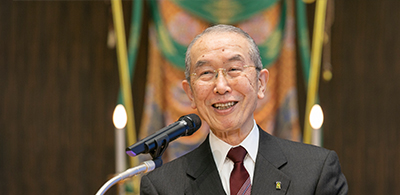Becoming Aware of Invisible Workings
August 2017

Faith Permits Becoming Aware
Although what follows is not an example of the brain training that is so popular in Japan these days, I would like to start this month’s guidance with a riddle.
Air, mind, and encounter. What do these three things have in common?
At first glance, there may seem to be no connection between them, but they do have something in common, which I will explain in this way: Although we cannot actually touch or see them, they are all so important that we cannot live without them.
That is the answer. Despite the fact that we seldom pay much attention to them, once we realize how important they are, we cannot help but feel grateful for them.
Thinking in concrete terms about the state of our mind and our relationships with others, such as the kind care demonstrated by our parents, the benefits received from our ancestors, the consideration shown by our family members, and the thoughtfulness expressed by our friends, we become aware that they are invisible, important things for which we are apt to forget to express gratitude. Of course, there are many other things to which the same logic applies. In your case, what comes to mind?
The Swiss painter Paul Klee (1879–1940) once said something to the effect that art enables us to see what is invisible, and it also can be said of religion and faith that they make visible what we cannot see. Properly speaking, religion and faith give us the opportunity to become aware of what is truly important for living as a human being, such as our own state of mind, the wonder and the miracle of life, and the sanctity of all life, which are invisible to our eyes.
Now, let us consider what this means in terms of the reality of our daily lives.
Accepting Things Honestly
Chapter 16 of the Lotus Sutra, “Revelation of the [Eternal] Life of the Tathagata,” contains the verse, “I always abide here teaching the Dharma.” In other words, the Buddha is always right by our side, continuing to teach us the Dharma.
However, the verse goes on to say, “Indeed, I am always dwelling in this world. However, using my transcendent powers, I cause living beings with distorted minds to be unable to see me, although I am near.” In other words, to us, the Buddha’s teaching of the Dharma is invisible, we cannot hear it, or apprehend it visually.
The reason for this, according to the sutra, is “living beings with distorted minds.” That is, we are apt to misinterpret things, or to see things from our own self-centered, biased point of view.
Well, then, what should you do to become aware of the Buddha’s message to you? The simplest method is to be accepting. If you are accepting, then you will be able to clearly see important things that cannot be seen with the naked eye and feel as if you are grasping the Buddha’s teaching. Is it not true that evidence of this can be found in the “Spiritual Journey” featured regularly in this online journal, as well as in the members’ testimonies given at the Great Sacred Hall and at your local Dharma center?
No matter how painful the reality may be, by accepting it honestly, each and every person will realize something important—some people may realize how many other people are supporting them, some people may experience the preciousness of life, and some people may keenly feel how considerate their friends and family are.
In all of those cases, the awareness of people is transformed into thankfulness that has never occurred to them before that time, and they may even bow their heads in gratitude before the harsh reality that served as the opportunity to gain that important awareness. Looking at the situation objectively, their predicament had not changed at all, but when they realize something important that is invisible to the eye, many people are filled with a sense of security, as if a great weight had been lifted from their shoulders. I think that is liberation.
Becoming aware of the working of invisible forces and hearing the voice of the Buddha is, in a manner of speaking, a shortcut to happiness.
This is the season when in Japan many people gather for the Bon holidays and summer vacation, during which they return to their hometowns for a family reunion, and celebrate the ancestors’ memory, so it may be a good opportunity to give some thought to the important things that cannot be seen with the eyes.
Back Number



